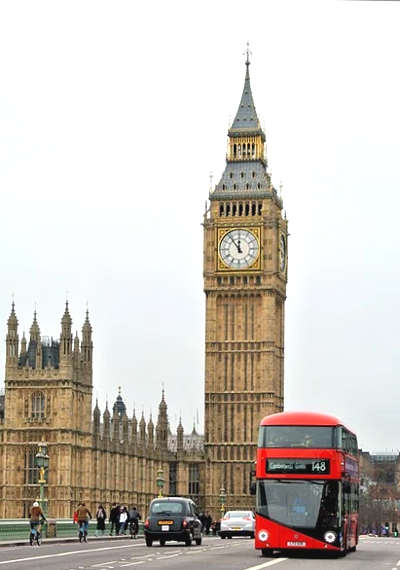New Life for Big Ben
A low-intermediate level English resource.
WITH AUDIO ►: Click to open/close audio playerIt's
the most famous clock in the world and it's over 160 years old. The
famous clock was completely renovated between 2017 and 2021, and now
it's back in service again

Big Ben and other London icons
If you have been to London, you have certainly seen "Big Ben." It's very difficult to miss, standing almost 100 metres high beside the Thames, next to the Houses of Parliament.
But have you actually seen "Big Ben"? Probably not!
The name "Big Ben" is generally used to refer to the big clock tower itself; but in reality, "Big Ben" is just the name of the biggest bell in the tower , the bell that chimes on the hour.
The famous clock tower was built in the 1850's, after the Houses of Parliament were burned down.
The new clock was to be the biggest in the world, and extremely accurate. Lots of people thought that this would be impossible; a very big clock, they thought, could not be very accurate.
In fact, they were wrong; and the clock has always kept time almost perfectly.
The original "Big Ben" bell weighed 16 tons, and was made in the North of England. However, after it had reached London, but before it had been put in place, it cracked! A new bell had to be made to replace it!
The original bell was therefore melted down (in London) and a new Big Ben was made, weighing "only" 13 tons! This bell was put in place in July 1859... but after two months it cracked. Experts decided that the hammer was too big; and after the bell was mended, and a smaller hammer was put in place, Big Ben began chiming again in 1862.
Since then, there have been several incidents. Once the clock stopped when a pot of paint got stuck between its hands! And in 1976, the clock stopped for 26 days, when a part of the mechanism broke.... after 114 years of service!
Between 1983 and 1985, the clock tower was completely cleaned and restored; but thirty years later, engineers decided that the tower and the clock were both in need of urgent repairs. Work began in 2017, and after four years of work, it returned to service in 2021.
BIG BEN'S SHINING FACES
At night, the clock faces are illuminated from inside. Originally they were lit up by gas lamps; then, for most of the twentieth century, by electricity. Now the faces are illuminated with "green" low-energy light-bulbs. Of course, the green light bulbs produce white light: the faces are not literally green!

to chime, a chime: the noise made by a bell - to miss: to not see - actually: really - accurate: precise, exact - to weigh: to have a weight of - to crack: to split - to melt down: to make something become liquid - hammer: object which is used to hit things with - mend: repair - to get stuck: to become fixed
Return to Linguapress site index
Printing: Optimized for printing
Copyright © Linguapress. Do not copy this document to any other website
Copying permitted for personal study, or by teachers for use with their students
Student Worksheet
New Life for
Big Ben
Read the article, and select the correct version of each of these sentences.
- Although it is very big, Big Ben is also very actual / accurate / clever.
- Big Ben stands beside the BBC building / the ITV studio / the Houses of Parliament.
- Big Ben was built in the 1850s before / while / after /
the Houses of Parliament burned down
- The present Big Ben bell was made in the North of England / in London / in July 1859.
- The clock has occasionally / often / never stopped.
The article contains some sentences in the active voice and others in the passive.
Rewrite information from the article, making factual sentences beginning as below. In each case you will need to rewite a passive sentence in the active, or an active sentence in the passive.
Every
day, Big Ben can....
Almost everyone in Britain .....
A fire destroyed .....
They had to melt.....
They had to mend....
Gas lamps .....
White light .....
Almost everyone in Britain .....
A fire destroyed .....
They had to melt.....
They had to mend....
Gas lamps .....
White light .....
Teachers:
For general techniques for using reading texts in class, see ► Reading texts - a
model lesson plan
This teaching resource is © copyright Linguapress 1994 renewed 2025.
Fully revised and extended 2022 . Originally published in Horizon, the Low-intermediate level English newsmagazine.
Republication on other websites or in print is not authorised
| Linguapress; home | Découvrez l'Angleterre (en français) | Discover Britain |




